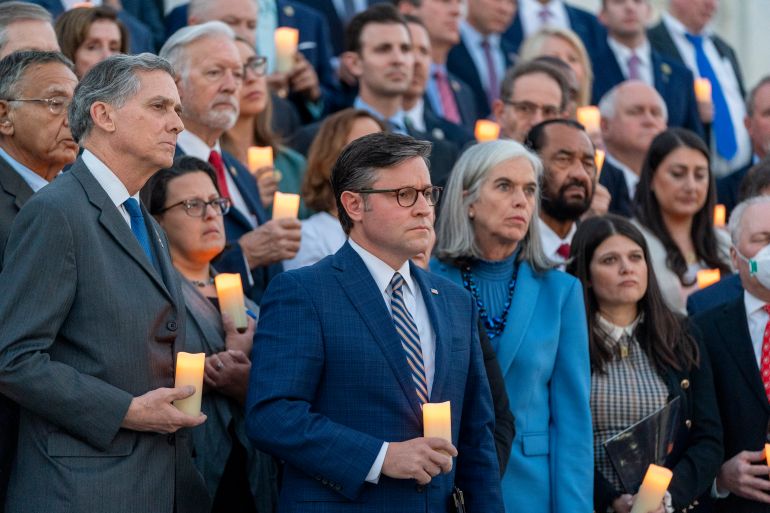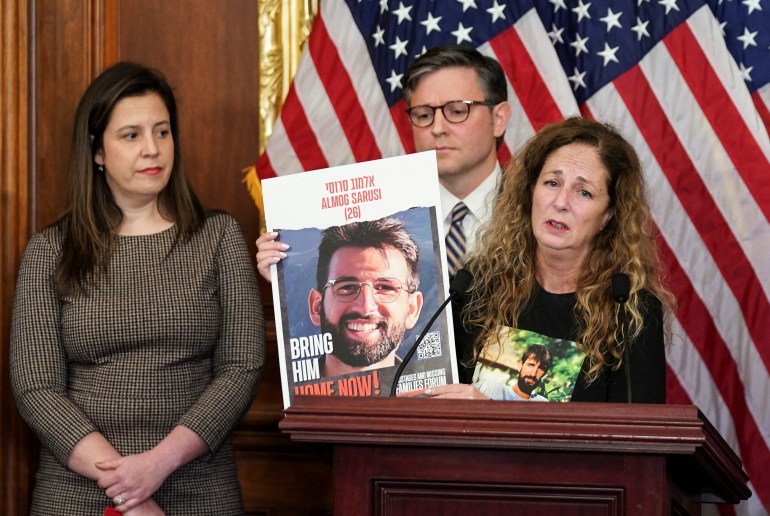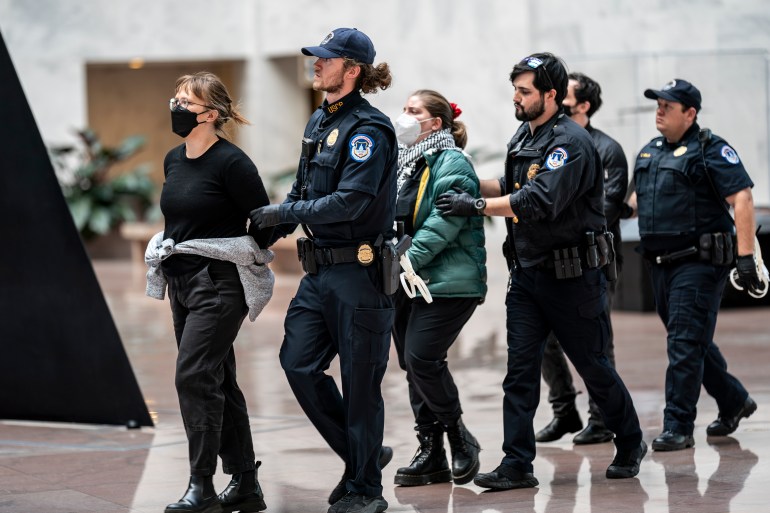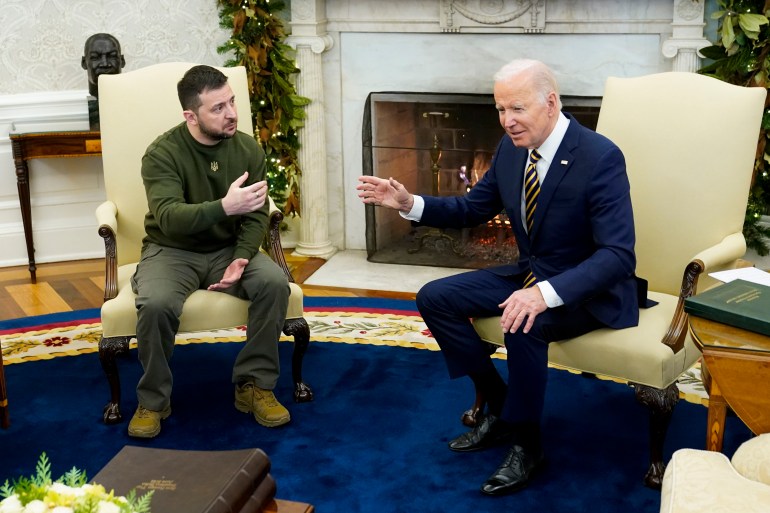Why are US Republicans pushing for aid to Israel but not Ukraine?
Experts say a fractured Republican Party is increasingly turning away from Ukraine in favour of support for Israel.

As wars continue to rage in both Ukraine and Gaza, another battle is playing out in the United States Congress: over which country should receive aid money.
In recent months, congressional Republicans have expressed increasing scepticism towards approving more funds for the government of Ukrainian President Volodymyr Zelenskyy, as his country seeks to repel a full-scale Russian invasion.
Keep reading
list of 3 itemsIsrael-Gaza war: Biden support plummets to 17 percent among Arab Americans
Biden’s Israel funding request gets scrutiny, hits early hurdle
But that opposition has grown since the start of the Israel-Hamas war on October 7, with some Republicans positioning aid for Israel and Ukraine as an either-or proposition.
“Israel is facing [an] existential threat. Any funding for Ukraine should be redirected to Israel immediately,” Republican Senator Josh Hawley posted on social media two days after the war began.
Experts say that disparate approach — with stronger Republican backing for aid to Israel than to Ukraine — signals the growing power of the party’s hard-right flank.
“Omitting aid for Ukraine is a concession to the far right of the Republican Party,” Richard F Bensel, a government studies professor at Cornell University, told Al Jazeera.
Ukraine, he added, “has neither the emotional appeal of a religious ally nor the geopolitical importance of Israel, and the differences between the two issues reflect deeper divisions within the Republican Party between secular rationalism and sectarian emotionalism”.

Trump’s lingering influence
The debate over foreign aid comes amid turmoil within the Republican caucus, which struggled last month to elect a speaker to lead the House of Representatives.
After weeks of internal fighting, religious conservative Mike Johnson finally won the gavel on October 25, in an apparent victory for hardline and evangelical interests.
One of Johnson’s first moves was to introduce a bill that included nearly $14.5bn in support for Israel but zero dollars for Ukraine. It passed the Republican-controlled House by a vote of 226 to 196, only to be shut down in the Democrat-led Senate on Tuesday.
Robert Y Shapiro, a political science professor at Columbia University, said the failed bill points to the continued sway former President Donald Trump holds over the Republican Party.
Trump is currently the Republican frontrunner in the 2024 presidential race. During his time in office, he championed an “America First” foreign policy that saw the US withdraw from certain international agreements, in favour of a more isolationist stance.
“This [bill] is clearly a show for the Trump base of the Republican Party, which opposes anything related to Ukraine,” Shapiro said.
Trump, he explained, has lingering resentment towards Ukraine. After all, questions over whether Trump illegally withheld military aid to Ukraine led to his first impeachment.
And then there was Trump’s cosy relationship with Ukraine’s adversary, Russian President Vladimir Putin, whom he praised on several occasions.

Since leaving office, Trump has remained critical of aid to Ukraine.
In campaign stops for his reelection bid, he called on Congress to cut off military assistance to the country, accusing it of paying “millions of dollars” to the “Biden crime family” — a reference to his Democratic rival, President Joe Biden.
Trump is hardly the first leader to push for more isolationism in US foreign policy: The sentiment was particularly strong after World War I, as the country tried to disentangle itself from continued tensions in Europe.
But Stephen Zunes, a professor of politics and international studies at the University of San Francisco, told Al Jazeera that isolationism is making a comeback.
“Recent years have witnessed a growing segment of the Republican Party moving away from its more overtly imperialistic and interventionist foreign policy to a more isolationist foreign policy,” Zunes said.
However, the strong Christian leanings in the Republican Party allow for a more easy embrace of aid requests for Israel.
“An exception is made for Israel, in large part due to the strong influence of fundamentalist Christians who believe that the modern state of Israel is the manifestation of Biblical Israel and therefore is in God’s favour,” Zunes explained.

The impact of war fatigue
Aid to Ukraine still has prominent supporters among the Republican Party, including Senate minority leader Mitch McConnell.
He called for military assistance to Ukraine, Israel and Taiwan to be packaged together, along with greater funds for US border security.
“We view all of these problems as connected,” McConnell told reporters at an October 31 press conference.
But US views overall are shifting towards the war in Ukraine, with Republican voters in particular retreating from their initial support for the embattled country.
A Gallup poll released on November 2 found that 41 percent of Americans believe their country is “doing too much” to help Ukraine, up from 29 percent this June.
The belief is most common among Republicans, 62 percent of whom agreed with that statement.
Some experts point to the prevalence of war fatigue among the American public. The war in Ukraine has stretched on for months since its start in February 2022, arriving at a seeming deadlock.
But the Israel-Hamas war is new. It was sparked on October 7 with a surprise attack from the Palestinian group Hamas, and it has continued over the last month with the steady Israeli bombardment of the Gaza Strip.
The US public has responded with large-scale protests in favour of Israeli and Palestinian causes. One pro-Palestinian march on Saturday brought thousands of people to Washington, DC, flooding Freedom Plaza.
“Part of [the issue] is that newer conflicts will get more attention than ongoing conflicts,” Zunes said. “Another is that the Gaza War is more violent. Israel has killed more Palestinian civilians during the past month than Russia has killed Ukrainian civilians in the past 20 months.”
Zunes also noted that Israel “plays an important role in advancing US strategic interests in the greater Middle East”, making support for the country more pressing.

Political polarisation
With withering Republican support for Ukraine, Democrats have largely helmed the push to bundle aid for the two countries together.
In October, President Biden called on Congress to approve a $105bn supplemental funding request, which included $61.4bn for Ukraine and $14.3bn for Israel.
But as Congress approaches its November 17 deadline to pass budget legislation — or else risk a government shutdown — experts suspect Biden’s funding request is unlikely to pass.
What’s more, the 2024 presidential race is heating up, with polls showing Biden and Trump neck and neck. Foreign aid will likely be one of many flashpoints.
“We won’t see a compromise between Democrats and Republicans,” Shapiro, the Columbia professor, told Al Jazeera. “The Republicans will almost certainly ultimately come together in opposing all things Democratic in the 2024 election.”
Bensel, meanwhile, spoke to the increasing polarisation across the political landscape. Not only does the Republican-controlled House butt heads with the president’s agenda, but it is also at odds with the Democratic majority in the Senate.
“The disagreements between the administration and the House of Representatives — and between the two chambers of Congress — are clearly driven by the very serious partisan divisions in the nation at large,” Bensel said.
That political impasse is not necessarily new, he added. “What is abnormal is the apparently irreconcilable split within the Republican Party in the House of Representatives.”